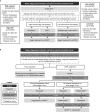Management algorithms for metastatic prostate cancer
- PMID: 31039111
- PMCID: PMC7012295
- DOI: 10.5489/cuaj.5840
Management algorithms for metastatic prostate cancer
Abstract
Introduction: Prostate cancer poses a significant lifetime risk to Canadian men. Treatment for metastatic prostatic cancer (mPCa) is an area of ongoing research with a lack of up-to-date clinical guidance. The multidisciplinary Canadian Genitourinary Research Consortium (GURC) determined that additional guidance focusing on management of mPCa was warranted.
Methods: The most up-to-date guidelines, consensus statements, and emerging phase 3 trials were identified and used to inform development of algorithms by a multidisciplinary genitourinary oncology panel outlining recommendations for the management of mPCa.
Results: A single pan-Canadian guideline and five national and international guidelines or consensus statements published since 2015 were identified, along with two new phase 3 trials and one additional randomized comparison. Iterative GURC discussions led to the development of two mPCa algorithms: the first addressing management of newly diagnosed metastatic castration-sensitive prostate cancer (mCSPC) patients and the second addressing treatment of patients with metastatic castration-resistant prostate cancer (mCRPC). For newly diagnosed mCSPC patients with high-volume/high-risk disease, either docetaxel or abiraterone acetate and prednisone (AAP) added to androgen-deprivation therapy (ADT) is recommended. The addition of radiotherapy to ADT is suggested for those with low-volume disease and/or AAP to ADT for low-volume or low-risk disease. For first-line mCRPC, androgen receptor-axis-targeted (ARAT) therapy is recommended for most patients, while sequencing with docetaxel, radium-223, ARAT therapy, and/or cabazitaxel is recommended for later lines of therapy.
Conclusions: Two treatment algorithms were developed for the management of mPC and can be used by multidisciplinary specialist teams to guide treatment.
Conflict of interest statement
Figures

References
-
- Canadian Cancer Society’s Advisory Committee on Cancer Statistics. Canadian Caner Statistics 2017. Toronto, ON: Canadian Cancer Society; 2017. [Accessed June 6, 2018]. Available at: http://www.cancer.ca/~/media/cancer.ca/CW/cancer%20information/cancer%20....
-
- Canadian Cancer Statistics Advisory Committee. Canadian Cancer Statistics 2018. Toronto, ON: Canadian Cancer Society; 2018. [Accessed Aug. 16, 2018]. Available at: cancer.ca/Canadian-Cancer-Statistics-2018-EN.
-
- Mottet N, van den Bergh RCN, Briers E, et al. EAU guidelines: Prostate cancer. 2018. [Accessed April 17, 2018]. Available at: https://uroweb.org/guideline/prostate-cancer/
Publication types
LinkOut - more resources
Full Text Sources
Miscellaneous
